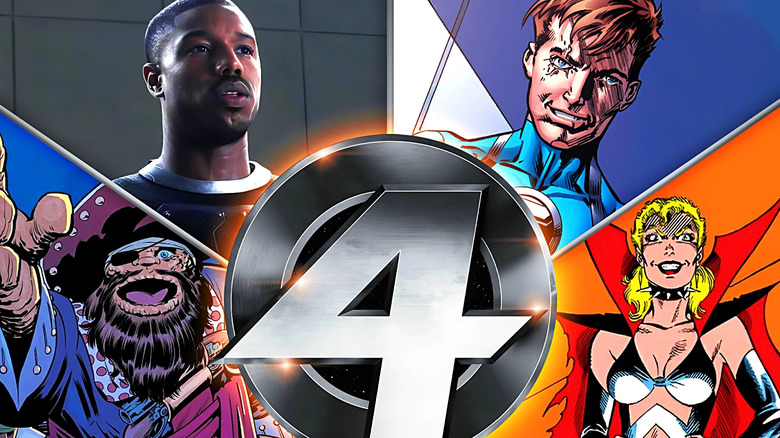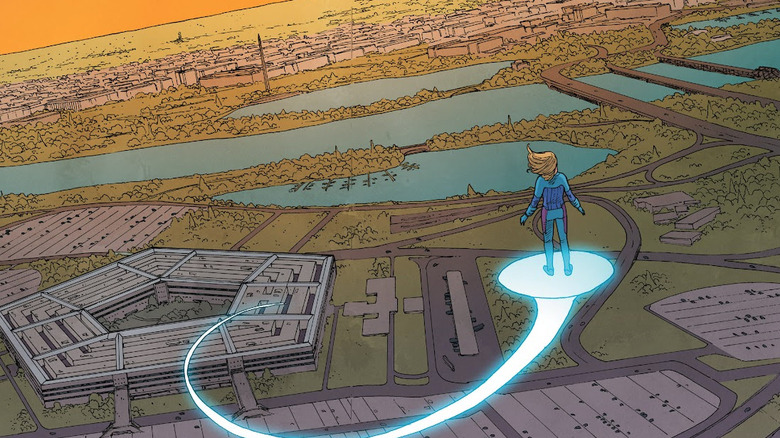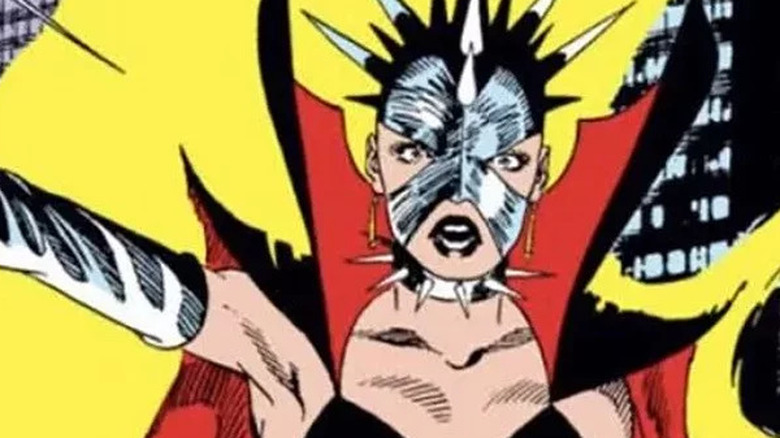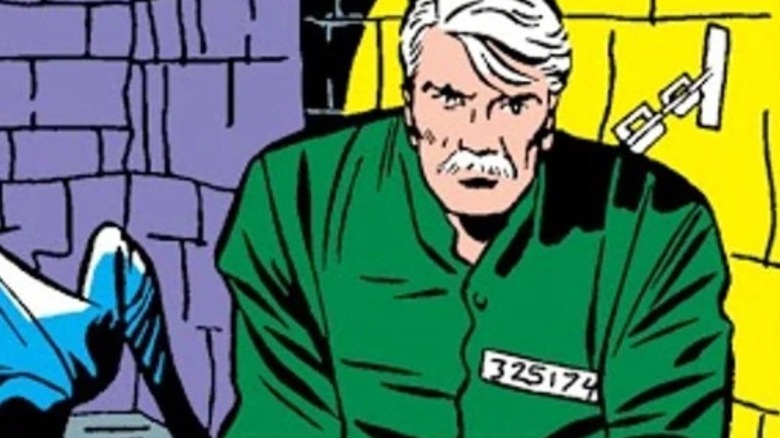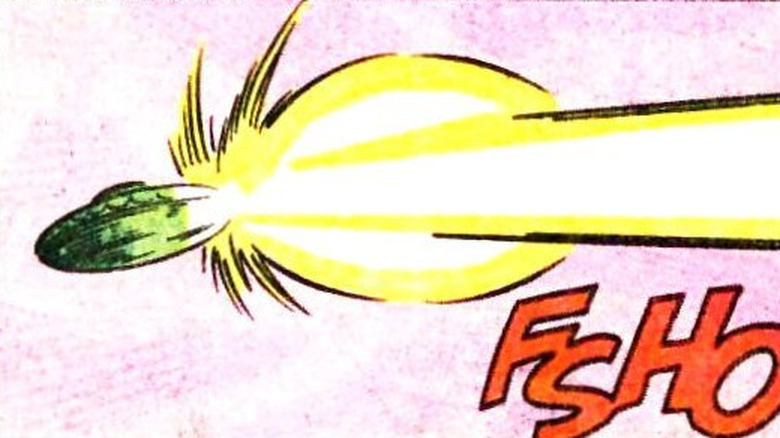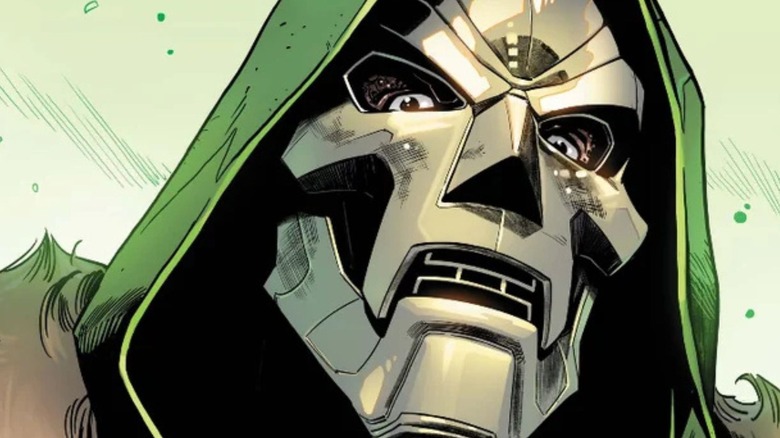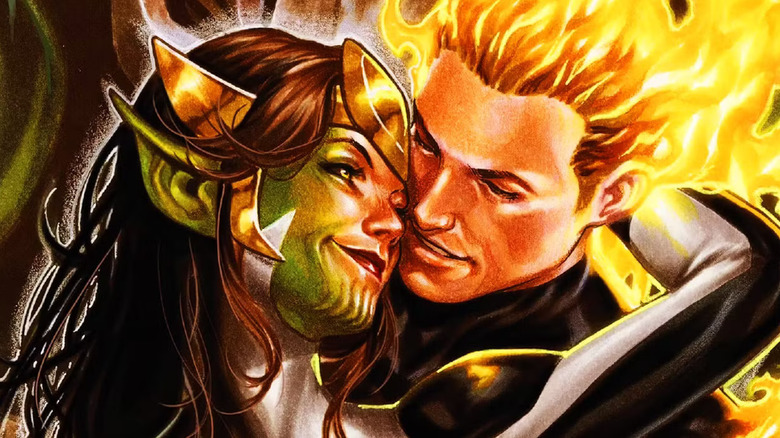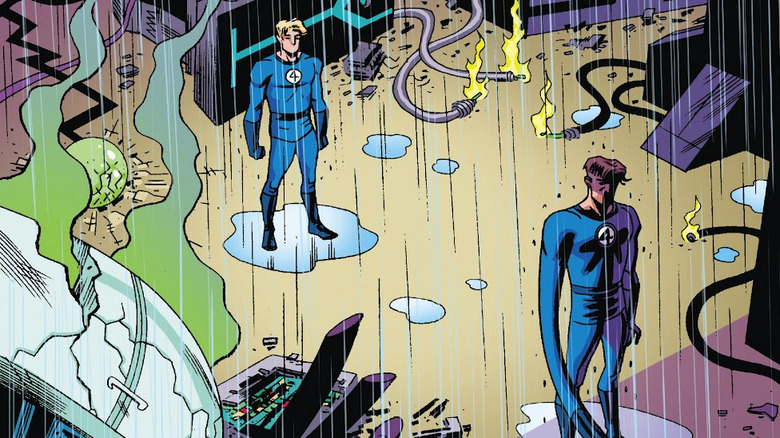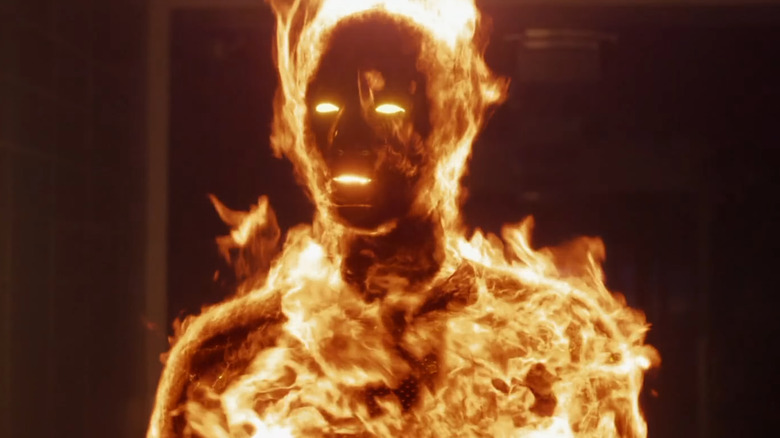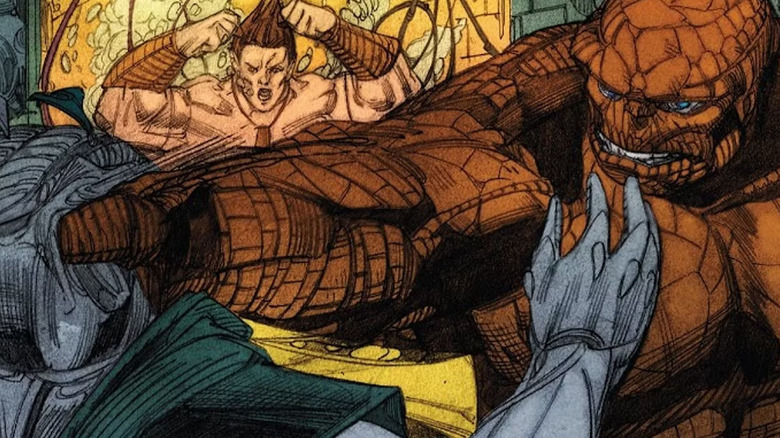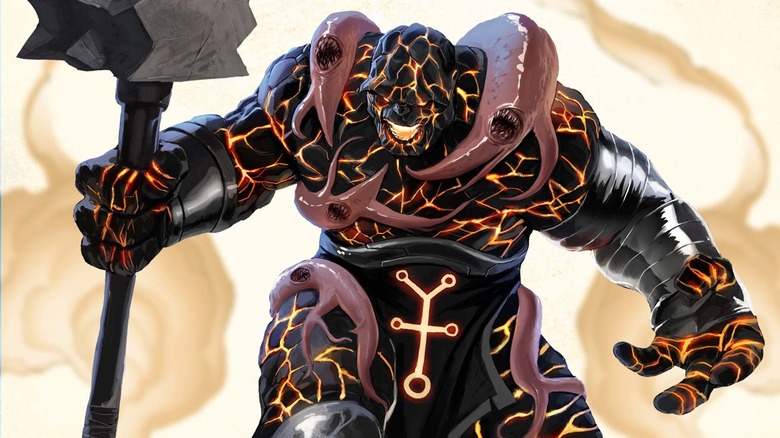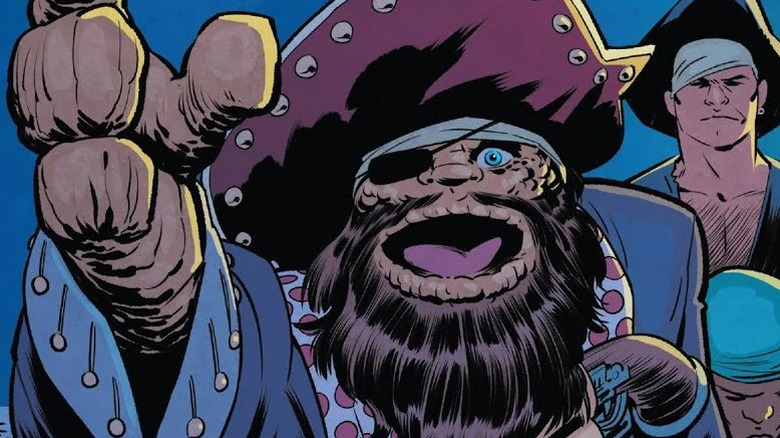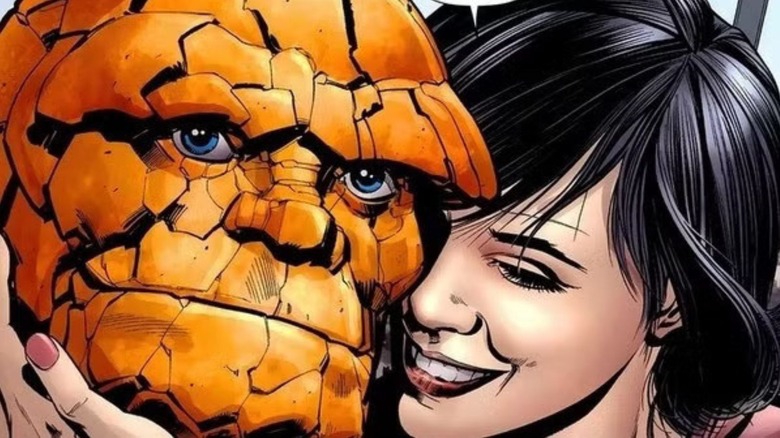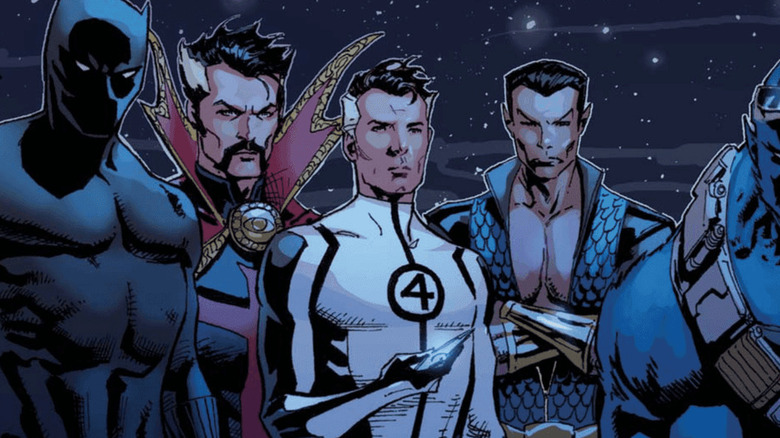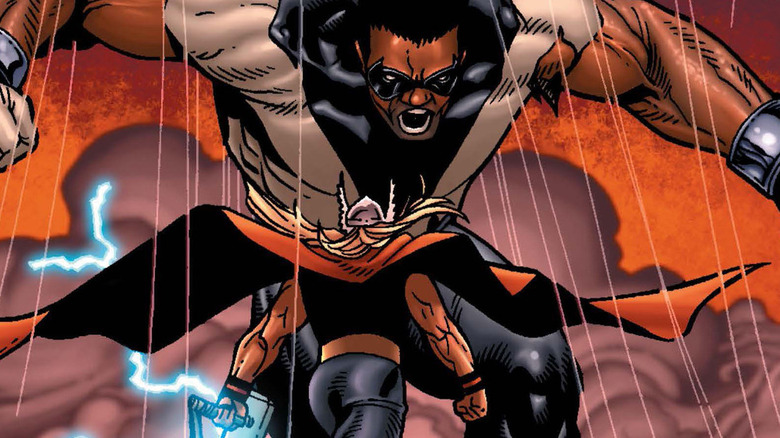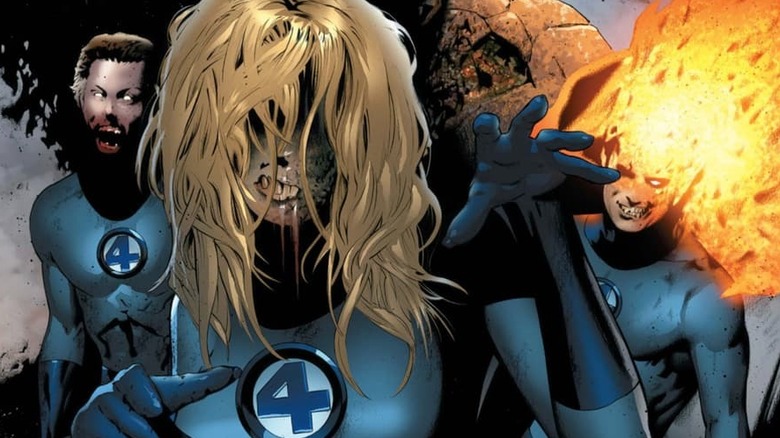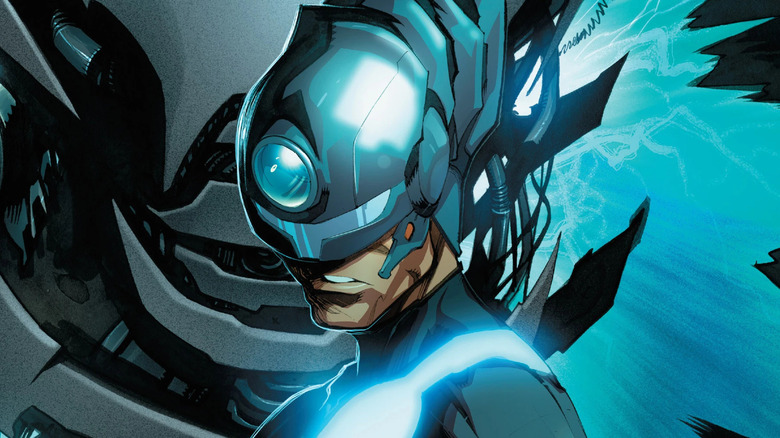The Worst Things The Fantastic Four Have Ever Done
The Marvel Cinematic Universe is set to enter a new age of scientific and, hopefully, cinematic greatness with the impending release of "The Fantastic Four: First Steps." After the disastrous reception of "Captain America: Brave New World" and the underwhelming commercial performance of the decently reviewed "Thunderbolts*," the new release from director Matt Shakman ("WandaVision") looms over the future of Marvel Studios like Galactus over a tasty-looking planet.
Much of the film's success will rest on the star-power of Marvel's First Family — the lovably gruff Thing ("The Bear" star Ebon Moss-Bachrach), the hot-headed Human Torch ("Stranger Things" alum Joseph Quinn), the steady Invisible Woman (Vanessa Kirby), and the preeminent superhero super-genius himself, Mister Fantastic (Pedro Pascal). With such a charismatic cast of talent assembled, Marvel will make certain their "First Step" is on the right foot by leaning into the love, heroism, and brilliance that make the Fantastic Four inspiring in the comics.
And yet, some of the team's most memorable moments see them acting in ways that are distinctly un-Fantastic. From dating each other's girlfriends and torturing villains to villainous alter-egos and unforgivable sins, we've uncovered the worst things each member of the Fantastic Four has ever done.
Trying to steal reproductive material
Marvel Comics' Ultimate Universe was an ... interesting experiment that largely saw the company's writers and editors try (perhaps too hard) to imagine darker versions of classic characters. Though the impact this vision had on the Ultimate Reed Richards is somewhat infamous, the disturbing deeds of Sue Storm's Ultimate Universe variant are often overlooked.
In the limited series "Ultimate FF," a Spider-Ham variant of Miles Morales convinces Sue that the only way for her to save the universe is to conceive a cosmically-powered child with Reed (who has already gone full genocidal maniac at this point). Given her hatred of Reed and her current devotion to Ben Grimm (the Ultimate Fantastic Four were, to put it bluntly, fantastically messy), she decides the only option is to incapacitate Reed, restrain him, and surgically retrieve his reproductive material. Again, these comics were ... interesting.
Reed convinces her to stop, but only long enough for them to decide she should actually steal Ben's reproductive material instead (which is, fortunately, stored just a few skips away in a S.H.I.E.L.D. facility). While The Thing seems mostly overjoyed at his sudden fatherhood, everything about Sue's plan is plain inhuman — which honestly explains why she once became the villain Kang the Conqueror in this reality.
Succumbing to sorrow and hate
Sue Storm is arguably one of the most morally sturdy characters in the Marvel Universe — even though she's usually married to a man whose morals are, ironically, way too flexible. This was especially true back when she went by the name Invisible Girl. However, when she tragically suffers a miscarriage, Sue is left emotionally vulnerable enough to be transformed into Malice, the Mistress of Hate. This alter-ego of Sue's was brought out by the emotionally manipulative supervillain Psycho Man, who psychologically forces her to be consumed by all the violently negative feelings she had been repressing throughout her life.
Free of moral restraint, Malice is able to use Sue's surprisingly destructive powers to wreak havoc on her family and city. The only thing more unsettling than her wanton rampage as Malice (or the questionable costume that has been revived by the video game "Marvel Rivals") is that when Sue regains control of her consciousness, she uses Psycho Man's powers against him, torturing him into a coma. As harrowing as it is, this entire ordeal is a strikingly complex chapter in Sue's life (so much so that Vanessa Kirby and Matt Shakman drew some inspiration from it for the character's portrayal in "The Fantastic Four: First Steps"), which ultimately led to her adopting the name Invisible Woman.
Postponing a wedding to go to war
Sue's torturing of Psycho Man isn't the first instance of her vengeful instincts leading her down a dark and violent path. Back in the 1960s during the original Stan Lee/Jack Kirby run of "Fantastic Four," Sue and her brother Johnny both suffered a personal tragedy after their father Franklin Storm (a gifted but troubled surgeon who gambled his life away and ultimately went to prison on manslaughter charges) is kidnapped by the Super-Skrull. When he is used as, essentially, a human bomb meant to target the Fantastic Four, he sacrifices himself to save his children.
In response, Sue refuses to marry Reed Richards until he uses his resources to invade the Skrull homeworld and avenge her father's death. Reed obliges, but it doesn't take them long to figure out that Franklin's killer was acting alone — the Skrull government even has him formally executed in front of Sue, though this obviously doesn't satisfy her anger.
Destroying an alien planet
"What If...?" stories are tricky to reckon with, continuity-wise. On the one hand, they're the purest representation of what an alternate universe comic book story is — on the other hand, it's strongly implied that they depict how the canonical versions of these characters would act if put in certain situations. In the case of Sue Storm, this dynamic makes one of her "What If...?" stories particularly damning — especially because it shows how bad her Skrull vendetta could have gone.
In 1989's "What If... the Fantastic Four Had Lost the Trial of Galactus," Reed Richards is executed by the Shi'ar Empire for not killing Galactus himself when he had the chance, thereby allowing the planet-eater to kill billions. In response, Sue mobilizes the remaining Fantastic Four against the Shi'ar, and, using a spacecraft with a powerful Skrull laser further amplified by the Cosmic Control Rod, she strikes the Shi'ar homeworld. This unintentionally triggers a chain reaction that destroys the planet entirely. By comparison, the Skrulls got off easy.
Cheating with Doctor Doom's fiancée
Johnny Storm is a notorious philanderer, but his affair with Doctor Doom's bride-to-be Victorious crosses a line, even for him. Having been invited to Doom's wedding as a friend, along with the rest of the Fantastic Four and a few other notable super-people, Johnny can't control himself and sleeps with Victorious before the ceremony. Overwhelmed with guilt, this leaves Victorious with no choice but to confess what they had done to Doom — though she probably didn't need to do so at the altar, in front of all their guests (including Namor the Submariner, who can't help but howl with laughter at the revelation).
To make it all even worse, Johnny himself was spoken for at the time. He had been dating the winged alien superhero Kalia (also known as Sky), who had come to Johnny after discovering that they were soul-bound to be ideal life partners. And, yes, Kalia is at the wedding as Johnny's plus-one when he sleeps with Victorious. It's unlikely we'll see anything like this happen with Joseph Quinn's character in the Marvel Cinematic Universe, even if Robert Downey Jr. makes his Doom debut in "First Steps."
Dating Ben Grimm's ex-girlfriend
Shockingly, Johnny Storm has found more damaging ways than infidelity to use romance as a weapon. When the team briefly went off-world for the original "Secret Wars" event, Ben Grimm chose to temporarily remain on a planet where he could revert to his human form. This, in and of itself, was a strange choice, given that Ben had a committed relationship with Alicia Masters on Earth. Not to worry, however — Johnny starts dating her almost immediately, creating a ton of future unnecessary tension between him and someone he claims to love like family.
The relationship is ill-fated, however, though not in the way you'd expect. "Alicia" is actually a Skrull sleeper agent named Lyja who took over Alicia's life in an attempt to infiltrate the Fantastic Four. With Ben off-world, romancing Johnny was merely a tactical pivot at first, though those feelings eventually became so real that she willingly got married to him. When her identity was revealed, she died helping the Fantastic Four rescue the original Alicia from a Skrull prison.
Ruining Ben's last shot at humanity
Stealing his "girlfriend" might have been the most disrespectful thing Johnny Storm ever did to poor Ben Grimm (and trust us, that's really saying something), but it's not the most shameful. What truly haunts the Human Torch seemingly more than anything else he's done in his life is that he is likely responsible for damning Ben to being the Thing for eternity.
As was revealed in the "Original Sin" event, Reed Richards actually developed a device that could change Ben back to the human form he missed so much. The only trouble was that this device was extremely erratic and could only be used once. Unbeknownst to Reed and Ben, Johnny unintentionally contaminated the experiment right before they got started, causing it to catastrophically malfunction.
When Johnny confesses what he did immediately after, an initially angry Reed tells Johnny to let him shoulder the blame for the failure. Given how this retcon recontextualizes the decades of cruel mockery and verbal abuse Johnny subjected Ben to, it's not surprising that this moment is burned in Johnny's memory.
Working for a corrupt government
The 2015 "Fantastic Four" film (also known as "Fan4stic") doesn't have a great reputation. It's widely regarded as the worst "Fantastic Four" film ever made, so depressing, messy, and mired in behind-the-scenes controversy that its director, Josh Trank, gave it a mixed review on Letterboxd (and even the screenwriter understands why it flopped as hard as it did).
That said, some vaguely interesting elements of world-building distinguished it from other adaptations of Marvel's First Family, particularly that they work in partnership with a shady U.S. Government. After they get their powers, however, this partnership becomes a lot more direct, with Tim Blake Nelson's corrupt government scientist eager to turn them into military assets. Though Reed (Miles Teller) and Sue (Kate Mara) reject this in their own ways, Johnny excitedly trains to become a state-sponsored super-assassin. As much of an impulsive hot-head as Johnny can be, traveling the world doing regime-change-by-fire country-to-country doesn't feel in-character — or particularly fantastic — to us.
Wait. Say that again?
Squishing Doctor Doom like a grape
Unsurprisingly, our not-so-fantastic jaunt down memory lane through the Fantastic Four's worst moments takes us once again to the Ultimate Universe (and not for the final time). In this reality, Doctor Doom secretly orchestrates a nearly apocalyptic catastrophe known as the "Ultimatium" by manipulating Magneto into waging war against the Ultimates, a super-team (essentially this Earth's version of the Avengers) who are responsible for the death of his son Quicksilver. The Master of Magnetism uses his powers to reverse the Earth's magnetic polarity, resulting in countless lives lost and untold environmental destruction.
When Ben and Reed learn that Doom was the puppeteer controlling Magneto through strings of grief, Ben marches into Doom's laboratory in Latveria and crushes his skull — or, at least, he believes he did. It is later revealed that this Doom was not actually Victor von Doom, but Mary Storm — Sue and Johnny's mother, who was believed to have died during the Ultimatum event but was actually, apparently, serving as Doom's successor during this time for ... reasons. Again, the Ultimate Marvel Universe is sometimes very ... interesting.
Terrorizing New York City with a cursed hammer
Due to the popularization of the Marvel Cinematic Universe version of Thor, some fans may not be aware that the God of Thunder had a very different origin story in the comics. Though he is stripped of his hammer and cast out of Asgard by his father Odin (as seen in the 2011 Marvel Studios film), he essentially has his spiritual essence transferred into the body of a human man named Donald Blake, who doesn't get a say in having his life, memory, and personality wiped away so that he can be used as vessel for Thor to learn about being nice to his dad or whatever.
This possessive aspect of the Marvel-Asgardian mythos was largely sidelined as Thor was revamped over the years, but was eventually explored in the modern Marvel era during the 2011 event "Fear Itself." During this event, Cul Borson, the God of Fear and supposed rightful All-Father of Asgard, seeks to dominate the realms by infecting various humans with the spirits of his disciples. One of these was Angrir, the Breaker of Souls, who uses The Thing as a vessel in the same way Thor used Donald. With newfound godly power, The Thing destroys much of his old neighborhood of Yancy Street and nearly kills multiple people, including Thor himself.
Becoming a pirate scoundrel
There was a surprising amount of internet chatter when a trailer for "The Fantastic Four: First Steps" revealed The Thing's rocky beard. As exciting as it is to see something so delightfully goofy from the comics translated to live action, it's really only the second-best facial hairstyle sported by Ben Grimm.
In the debut issue of none other than Doctor Doom, the iconic villain sends Ben, Reed, and Johnny back in time to steal the lost treasure of the legendary pirate Blackbeard. As it turns out, however, Blackbeard is actually just the Thing in disguise, having taken over a ship while hiding in the past. Hilariously, Ben loves being Blackbeard (or "Thingbeard," as some fans call him) so much that he refuses to return to the present with his family. He's so drunk off historical power and pirate booty that it takes a literal tornado and a violent shipwreck to knock some sense into him.
Leaving someone at the altar
On a more serious note, one of the most compelling and heartbreaking aspects of Ben Grimm as a character is how he — perhaps more than any other mainstream Marvel superhero — hates what his powers have done to him. His rock-like exterior makes him feel alienated from the rest of the world, even though he yearns for human connection like anyone else.
Despite his insecurities, Ben has found love and even been engaged many times, at one point with a normal human woman named Debbie Green. They quickly fell for one another after she heard Ben speak at his elementary alma mater, with him popping the question a mere six weeks after they'd met. Debbie says yes, and — due to the Fantastic Four's high-profile and a fiery message of congratulations in the sky (thanks to Johnny showing some uncharacteristically genuine enthusiasm for Ben's happiness) — she becomes a public figure herself overnight.
At first, Debbie and Ben are amused by her "fans," who cheer her on as the newest member of the universe's most beloved family. But when Ben starts to receive threats from his most dangerous enemies, he panics. On the day of the wedding, Ben disappears to a bar, leaving Debbie alone at the altar with no warning or explanation.
Destroying worlds with the Illuminati
Of course, no member of the Fantastic Four is as prone to cold moral abnegation and outright evil than Reed Richards. He's the sort of comic book character that could easily take up a list of this kind entirely with his own actions, and it's frankly very telling that the least of his misdeeds on this list is his membership in the Illuminati.
As seen in the 2022 film "Doctor Strange in the Multiverse of Madness" (in which Reed was played by an ostensibly fan-cast John Krasinski, before he was replaced by Pedro Pascal), the Illuminati is a team of Marvel's most powerful and pragmatic figures. The core members unsurprisingly include most of the richest people in the Marvel Universe, including Doctor Stephen Strange, Tony Stark, Black Bolt, Hank McCoy/Beast (having taken the place of a deceased Professor X), Namor, T'Challa, and Reed.
The Illuminati represent the worst parts of Marvel's super-geniuses, as they convince themselves in their isolation and narcissism that they should play gods to secretly protect humanity from various threats. Most notably, they exercise this assumed responsibility during the lead-up to the second "Secret Wars" event by preemptively destroying other worlds that threaten their survival. (That said, Reed earns some points for working with his son Franklin after "Secret Wars" to rebuild the Multiverse he helped fracture.)
Supporting the Registration during the Civil War
While Reed played more of a background role in the Illuminati's murky mitigation of multiversal incursions, he still deserves a fair share of the blame for the consequences — the same goes for his participation in the superhero Civil War. Much like the MCU film "Captain America: Civil War," the majority of the drama focuses on the conflict between Tony Stark and Steve Rogers, who, in the aftermath of a deadly superhero-related tragedy, are respectively for and against superpowered people registering with the U.S. government as military assets and making their identities known to the public.
Reed sides with Tony and the pro-registration side, and chooses to help lead the charge to apprehend and jail offending heroes. To bolster their firepower, he takes the liberty of making a cybernetic clone of Thor that — robbed of the Asgardian's humanity — doesn't think twice about firing a bolt of lightning through the stomach of Bill Foster/Goliath, killing him instantly. Even worse, he helps build an extradimensional blacksite prison called "Prison 42," which they use to indefinitely detain anti-registration heroes.
Zombifying the Fantastic Four
In fairness to Reed, no alternate universe on this list deserves as much of a morality asterisk as the universe of the "Marvel Zombies" series. All the heroes and villains you know and love from the mainstream Marvel continuity have been so broken physically, mentally, and spiritually that it's hard to hold them accountable for their actions after a certain point.
For Reed, this point was the admittedly horrific deaths of his children, Valeria and Franklin, whom he helplessly watched be devoured by a zombified She-Hulk. Characteristically, his grief was channeled into purpose — which quickly and curiously translates his horror into a bizarre fascination with how efficient these zombies actually are.
By the time Sue is able to see through her own pain long enough to realize Reed is losing himself to a maladaptive fixation, it's too late. Marvel's master scientist has already decided that the undead are far more optimized, so he does his family a "favor" and infects them with the virus against their will. He only spares himself so that he can experience a pure transformation (which, to be clear, takes the form of his family mindlessly chewing through his flesh as he laughs).
Going mad in the Ultimate Universe
There's no better way to bring this worst-of list to a close by paying due (dis)respect to a Fantastic Four member who became one of Marvel's most evil villains — the Ultimate Universe Reed Richards, also known as The Maker.
In the aftermath of the Ultimatum tragedy, this Reed's already tenuous grasp on humanity got weaker, leading him to misuse his genius in megalomaniacally dangerous ways. Though he at first seems to genuinely believe his actions are in the service of an objective greatest good, 900 years in a time-displaced laboratory soon robs him of all values outside of a thirst for absolute power. Thus, this version is an unrepentant murderer with a body count in the billions; in addition to killing most members of the U.S. federal government and going on a genocidal rampage against the Asgardians, he personally led the Ultimate Universe's bloody fight for survival during the incursions.
More recently, The Maker has attempted to remake his lost Ultimate Universe on Earth-6160. He largely prevents the existence of most major Marvel superheroes on this earth, keeping himself in total control — and for a Reed Richards of any reality, whether or not they would admit it, this is a fate they'd find pretty fantastic.
